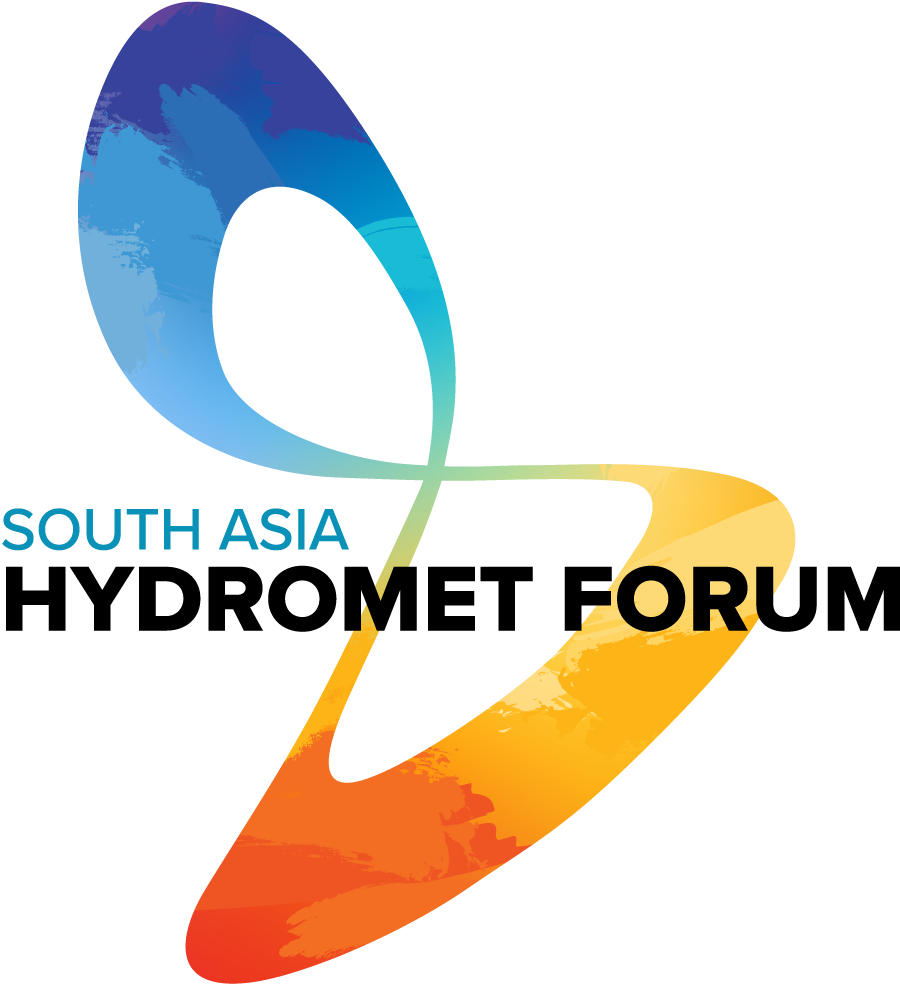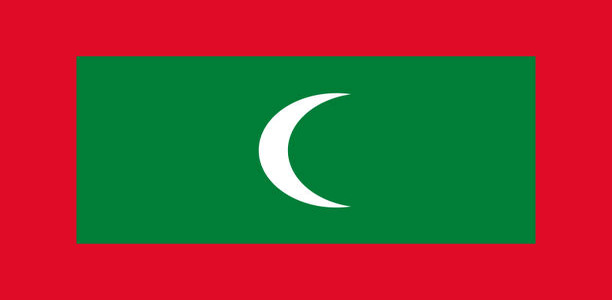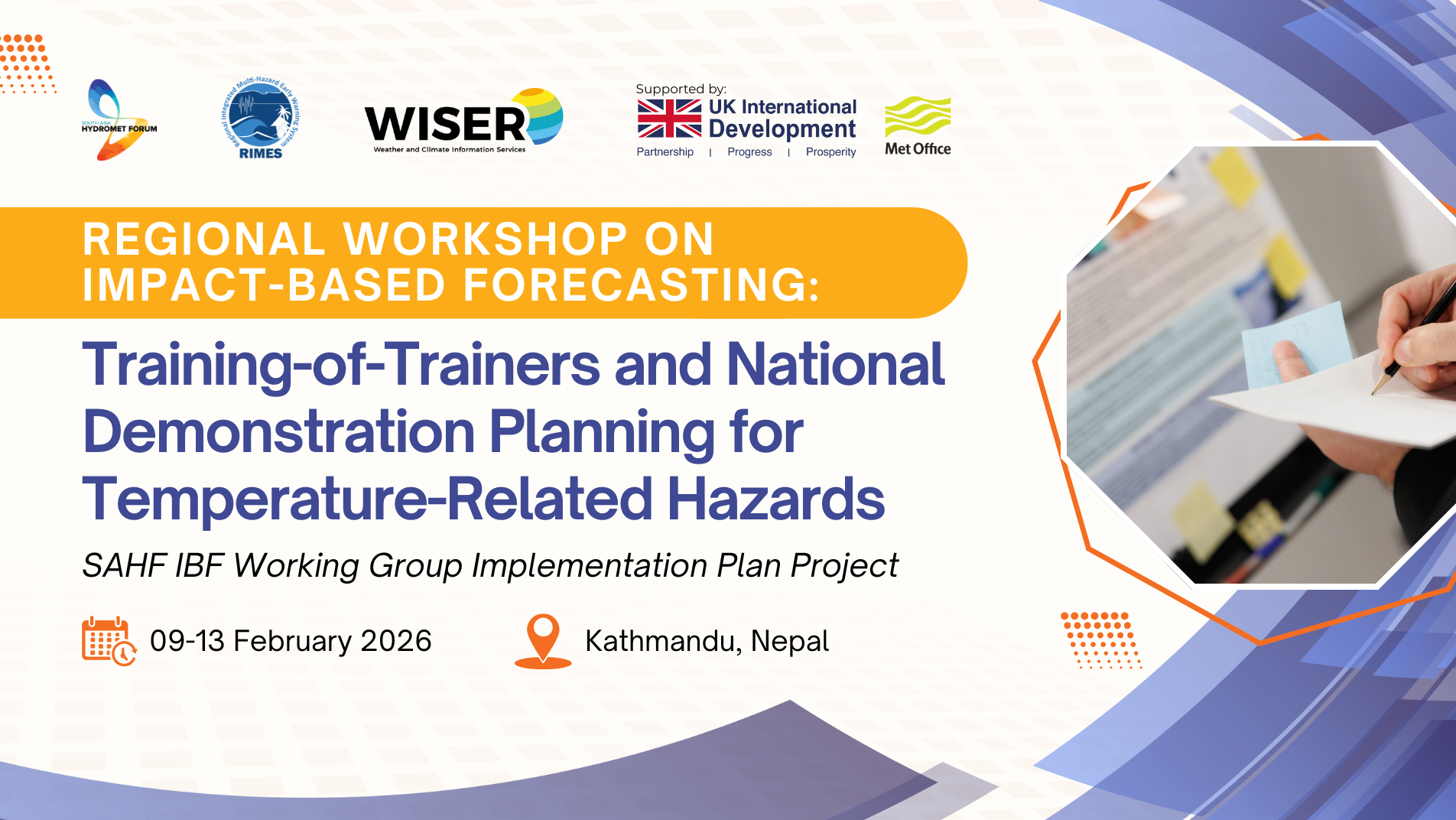

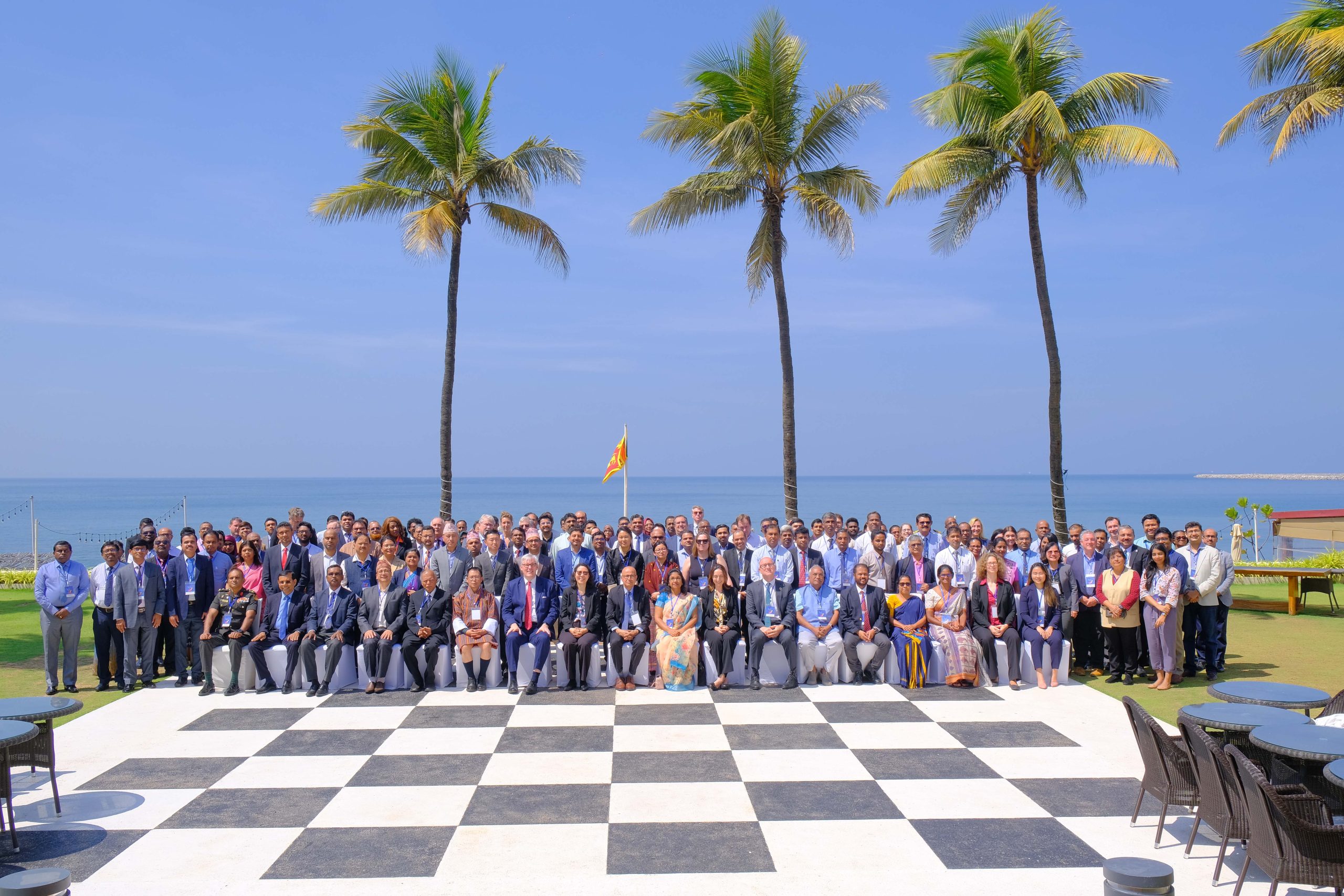 learn more
learn more
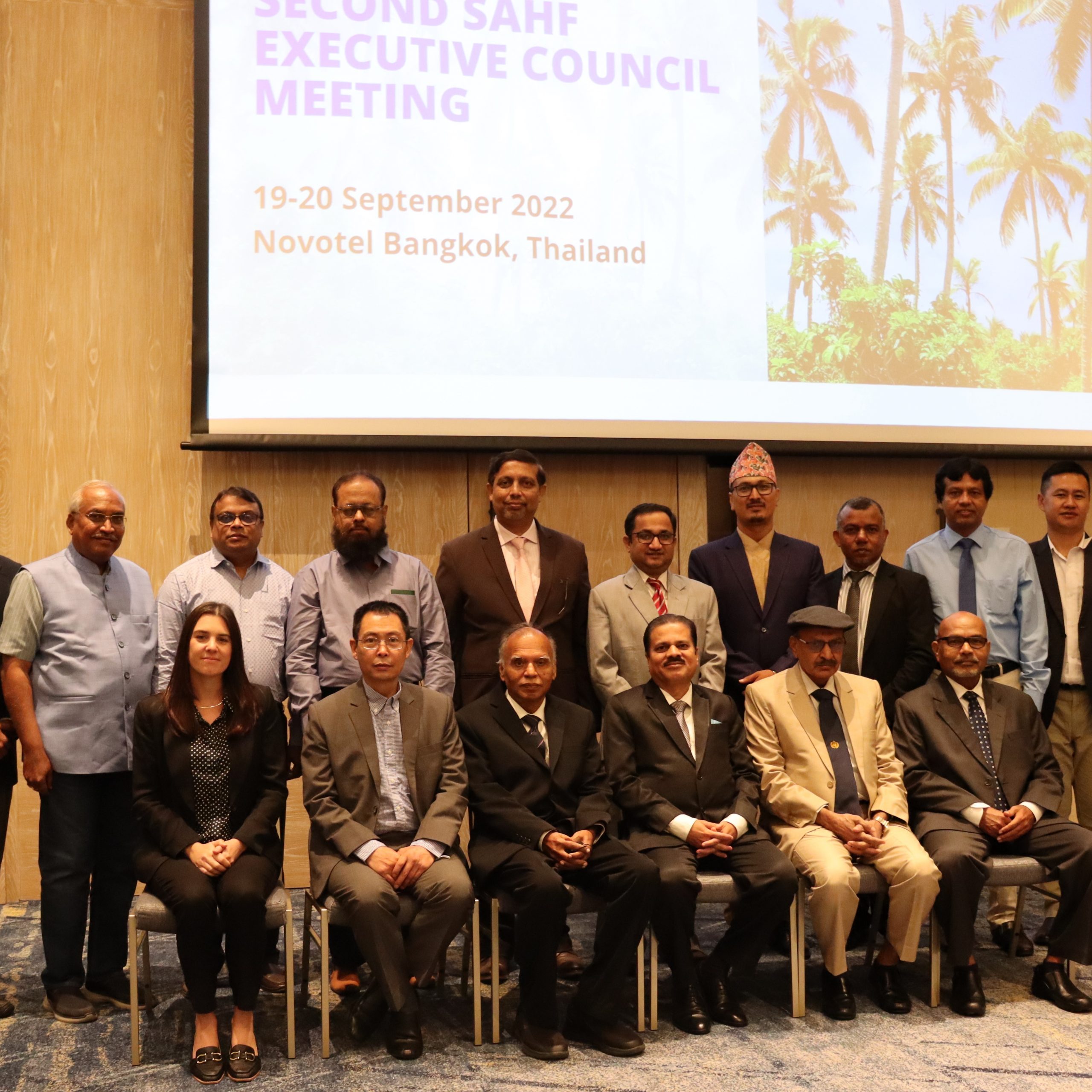
Other Resources




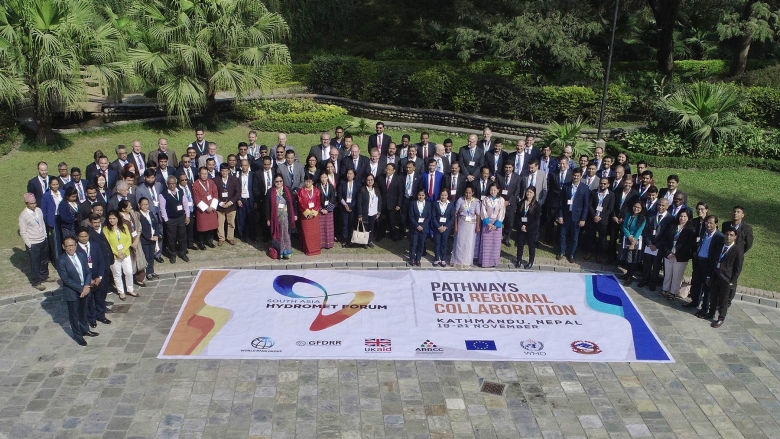
Overview
South Asia Hydromet Forum (SAHF) is a regional initiative that provides capacity building and training activities to support National Meteorological and Hydrological Services (NMHSs) to generate and transform climate data into reliable information that are critical in saving lives and assets and strengthening the resilience of communities in South Asia.

Resilient Asia Program
The Resilient Asia Program (RAP) is a World Bank-supported initiative that strengthens collaboration and enhances capacities across South Asia to improve hydrometeorological, early warning, and climate services. Since 2023, RAP has supported the work of the South Asia Hydromet Forum (SAHF), fostering regional and sub-regional cooperation for more effective climate resilience. RAP forms part of the UK FCDO’s Climate Action for a Resilient Asia (CARA) programme and aims to accelerate transformational climate action across the region.
CREWS for South Asia
The Climate Risk and Early Warning Systems (CREWS) initiative is a financial mechanism which funds projects in the Least Developed Countries (LDCs) and Small Island Developing States (SIDS) to establish risk-informed early warning services. CREWS represents a groundbreaking regional initiative designed to strengthen collaboration and enhance early warning capabilities across South Asia. Built around and in support of the South Asia Hydromet Forum (SAHF).


WISER For Asia Pacific
WISER (Weather and Climate Information Services) is a UK government-funded initiative delivering transformational change in the quality, accessibility and use of weather and climate information services. In April 2023, the programme expanded to launch WISER Asia-Pacific, a nine-year (2023–2031) initiative under the FCDO’s Climate Action for a Resilient Asia (CARA) programme. The WISER programme aims to deliver transformation in the generation and use of co-produced weather and climate services to support decision making at local, national, and regional levels, building resilience to the impacts of climate change.
Objectives
To develop and implement a regional cooperation activity on behalf of members in South Asia which includes Afghanistan, Bangladesh, Bhutan, India, Maldives, Nepal, Pakistan, and Sri Lanka, of the RIMES Council and to coordinate the SAHF regional capacity development process as well.
The World Bank evolved a Terms of Reference recommended implementing regional program aiming at:
- Supporting and liaising with key stakeholders for implementation of the program,
- Conducting a regional study to provide recommendations for strengthening elements of hydro-met service value chain.
- Facilitating the development and implementation of capacity building,
- Managing a regional information and communication platform.
The regional technical assistance project shall complement and reinforce national activities leading to a more sustainable program of development of meteorological and hydrological services throughout the region. Serving as anchor for the SAHF the process shall foster “learning from each other” and adoption of a futuristic approach for NWP/EPS based national and regional systems that leverage best available global products to develop solutions to the meteorological and hydrological challenges unique to the region.
- Setting-up a regionally coordinated training mechanism/coordination hub to build technical and institutional capacity of NMHS in South Asia on Operational Forecasting and Service Delivery through cost-effective and sustainable regional approach through assessments, evaluation, and consultations, to provide recommendations for strengthening key elements of the hydro-met service value chain.
- Facilitate operational cooperation among SAHF NMHS with necessary support from global and regional centers of excellence, to enhance the weather, climate, and hydrological services in South Asia with emerging advancements in forecasting and services to meet the growing demands from the stakeholders.
- Working Groups to conduct a regional study to formulate recommendations for strengthening key elements of the service value chain and develop and implement capacity building activities on forecasting and service delivery with an emphasis on ensemble prediction, impact-based forecasting, advisory services, and business integration.
- The training programs developed as part of the project shall be conducted every year on a continuous basis to build the capacity of forecasters in the region, and thereby their services.
The SAHF regional initiative is to ensure the capacity building activities enabling NMHS to not only address the current demand, but also the growing demand for the next 5-year period. The capacity building initiative shall support the following:
- Create conditions that all developing countries could provide a level of service that protects the lives, livelihoods, and economic opportunities of citizens at least as well as the most advanced societies.
- NMHS are in a position to embrace modern approaches to numerical prediction and ensemble predictions
- NMHS to provide valuable information about the likelihood of an event, and coupled with information on the potential impacts, provide users with warnings of the severity risks
World Bank supported CARE project builds data analytical platforms focusing on application of climate information in key sectors and SAHF efforts in the initial phase are focused on improving shorter range NWP services covering a period from days to weeks as well as using EPS and other products.
SAHF mechanism provides the basis for generating impact-based forecast in combination with vulnerability information at sub national levels. This will bring synergy for the longer-term climate change information which will drive the CARE data platform. This will be an effective mechanism which shall support decision making and planning in seamless manner in sectoral agencies pertaining to climate resilience.
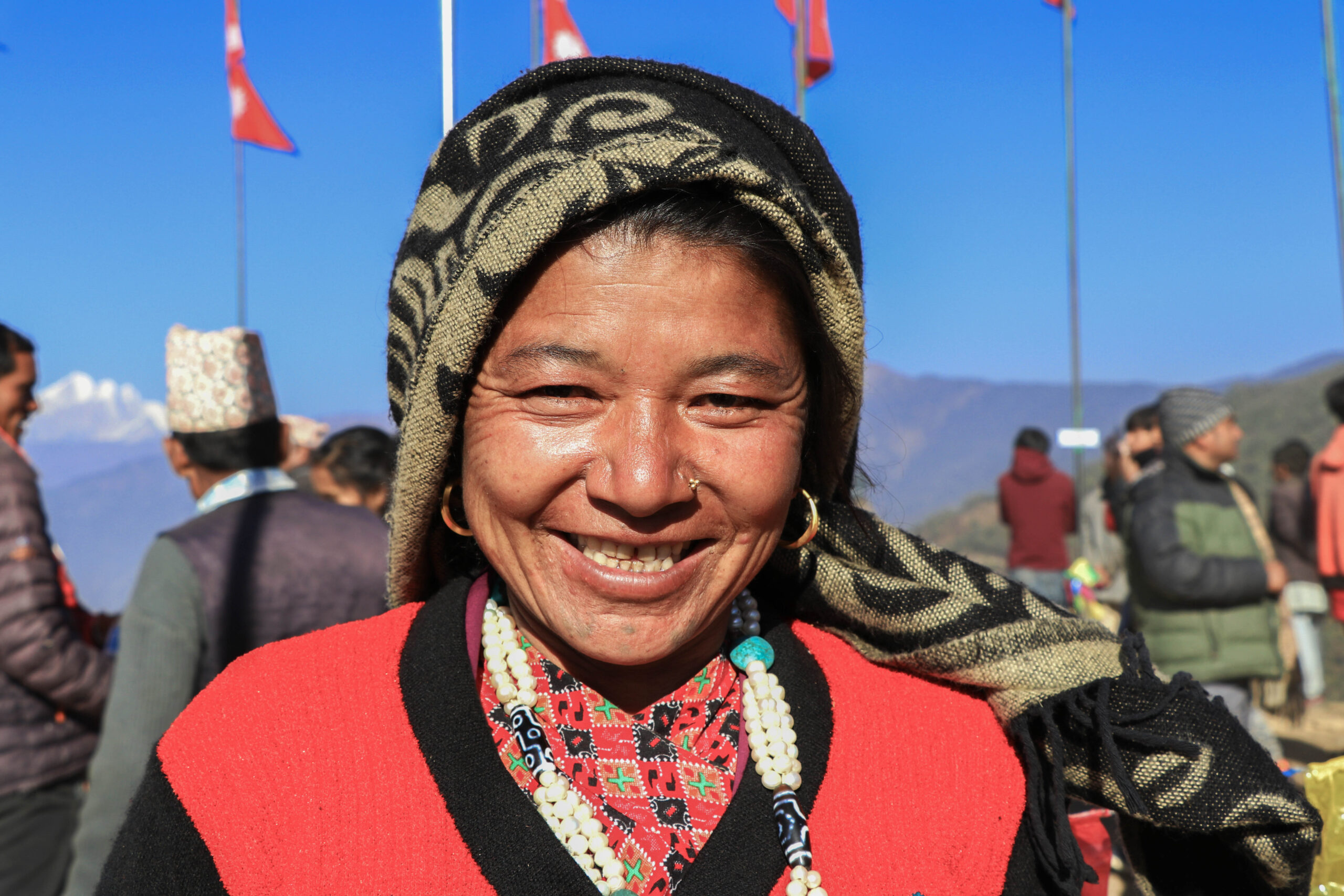
Outcomes
Protection of Lives
An environment where developing countries can deliver a level of service that can ensure the protection of lives and livelihoods against climate related disasters.
Weather Predictions
NMHSs embrace modern approaches to numerical weather prediction and ensemble prediction systems.
Early Warnings
NMHSs provides critical information about extreme weather events, as well as information on the potential impacts and warnings of the severity of risk.
Ongoing Activities

Hydromet Modernization Efforts in the Region
In Afghanistan, years of wars have impeded development. However, an initiative to modernize the meteorological service has started 3 years ago, and the government is committed to it, as well ...
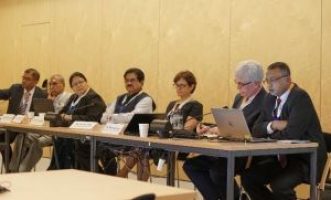
Linking Communities to Weather and Climate Service
The Department of Agriculture and Extension of Bangladesh briefly presented the Agrometeorological Information Systems Development Project, which is the Component-C of a Bangladesh Weather and Climate Services Regional Project.
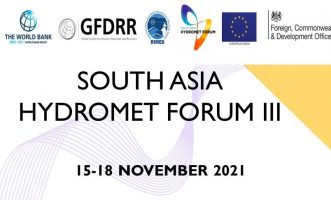
SOUTH ASIA HYDROMET FORUM III
SAHF III expanded on the SAHF I & II – which focused on service delivery, regional collaboration, and innovation- through adoption of a climate/ early warning information value chain approach.
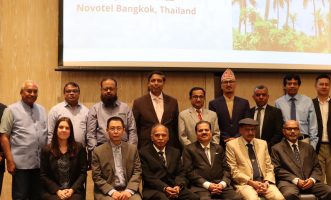
Second Session of the SAHF Executive Council (EC)
After its inception, EC’s first in-person meeting convened to review progress, agree on strategies and actions identified in the SAHF Regional Approach, establish a mechanism to sustain SAHF beyond the ...
Member Countries
- Developing a regional platform
- Learning from each other
- RIMES role in the process
- Meeting the growing demand
- Meeting the growing demand
To develop and implement a regional cooperation activity on behalf of members in South Asia which includes Afghanistan, Bangladesh, Bhutan, India, Maldives, Nepal, Pakistan, and Sri Lanka, of the RIMES Council and to coordinate the SAHF regional capacity development process as well.
The World Bank evolved a Terms of Reference recommended implementing regional program aiming at:
- Supporting and liaising with key stakeholders for implementation of the program,
- Conducting a regional study to provide recommendation for strengthening elements of hydro-met service value chain.
- Facilitating the development and implementation of capacity building,
- Managing a regional information and communication platform.
The regional technical assistance project shall complement and reinforce national activities leading to a more sustainable program of development of meteorological and hydrological services throughout the region. Serving as anchor for the SAHF the process shall foster “learning from each other” and adoption of a futuristic approach for NWP/EPS based national and regional systems that leverage best available global products to develop solutions to the meteorological and hydrological challenges unique to the region.
- Shall set-up a regionally coordinated training mechanism/coordination hub to build technical and institutional capacity of NMHS in South Asia on Operational Forecasting and Service Delivery through cost-effective and sustainable regional approach through assessments, evaluation, and consultations, to provide recommendations for strengthening key elements of the hydro-met service value chain.
- Shall facilitate operational cooperation among SAHF NMHS with necessary support from global and regional centers of excellence, to enhance the weather, climate, and hydrological services in South Asia with emerging advancements in forecasting and services to meet the growing demands from the stakeholders.
- Shall convene Working Groups to conduct a regional study to formulate recommendations for strengthening key elements of the service value chain and develop and implement capacity building activities on forecasting and service delivery with an emphasis on ensemble prediction, impact-based forecasting, advisory services, and business integration.
- The training programs developed as part of the project shall be conducted every year on a continuous basis to build the capacity of forecasters in the region, and thereby their services.
The SAHF regional initiative is to ensure the capacity building activities enabling NMHS to not only address the current demand, but also the growing demand for the next 5-year period. The capacity building initiative shall support the following.
- Create conditions that all developing countries could provide a level of service that protects the lives, livelihoods, and economic opportunities of citizens at least as well as the most advanced societies.
- NMHS are in a position to embrace modern approaches to numerical prediction and ensemble predictions
- NMHS to provide valuable information about the likelihood of an event, and coupled with information on the potential impacts, provide users with warnings of the severity risks
The SAHF regional initiative is to ensure the capacity building activities enabling NMHS to not only address the current demand, but also the growing demand for the next 5-year period. The capacity building initiative shall support the following.
- Create conditions that all developing countries could provide a level of service that protects the lives, livelihoods, and economic opportunities of citizens at least as well as the most advanced societies.
- NMHS are in a position to embrace modern approaches to numerical prediction and ensemble predictions
- NMHS to provide valuable information about the likelihood of an event, and coupled with information on the potential impacts, provide users with warnings of the severity risks
